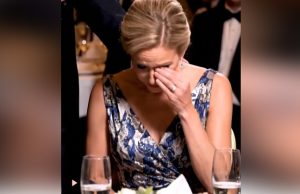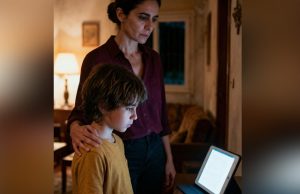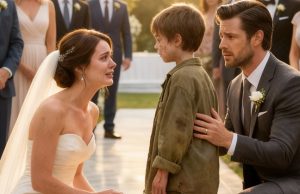
Night had already cloaked the forest, turning the trees into faint outlines against the dusky sky.
In the stillness, as most families settled into the comfort of their homes, a strange scene unfolded deep within the woods. An elderly woman led two children—her grandchildren—through the thickening darkness.
“We’ve arrived!” Valentina Igorevna declared, her voice unnervingly cheerful. “They told me you’re evil… and I must rid the world of you.”
The boy stared at her, puzzled. “Grandma, why do you think we’re evil?”
“Silence!” she snapped. “You’ll turn into worms and consume everything good!”
But her anger faded as qui

ckly as it had come, and she gently stroked their hair, tears spilling from her eyes.
“Don’t be afraid. Your mother will be grateful when I free her from you,” she whispered as if convincing herself.
She sat down and began clawing at the dirt with her bare hands, digging a shallow hole. Into it, she placed an old broom—a strange, symbolic gesture, as if marking the place for something grim.
“I’m cold, Grandma. Let’s go home,” the little girl pleaded, her voice trembling.
Her words pierced something inside Valentina. The old woman suddenly laughed, a shrill sound that echoed in the stillness.

“No! You k!lled your mother! This is where you stay! You’ll never return home!” she shrieked before bolting into the woods, disappearing into the shadows.
The girl, Anya, burst into tears.
Her older brother wrapped an arm around her, guiding her through the underbrush, desperately trying to find a way out.
The forest was biting cold, and their grandmother had dressed them carelessly—thin clothes that offered no protection from the night’s chill.
Elsewhere, a woman named Nadezhda had just finished picking through rubbish at the dump.
She selected what little could be reused and loaded it onto her cart. Her tiny shack, though lonely, had become her sanctuary after a life full of heartbreak.
She once had a husband she adored, but he turned out to be a drunk and a liar who spun tales about captaining deep-sea vessels.

Nadezhda, a milkmaid at a local farm, worked tirelessly, taking extra shifts to support them. Yet, all her earnings vanished at the bottom of a bottle, shared with his drinking buddies.
She had two children whom she often brought to work. But the violence, the constant shouting, and his alcoholism wore her down.
She finally filed for divorce. But fate played a cruel trick—she left the kids behind just for the day to cover for a sick co-worker.
Her husband, left alone, relapsed. That day, he lit the stove and sealed the chimney too soon. Carbon monoxide filled the home.
Nadezhda returned to a nightmare—both children were gone.

The loss shattered her. Grief consumed her until she lost touch with reality, wandering cemeteries and eventually taking to drink.
She lost her job, her home, and drifted to the edge of society, living among scraps.
One bitter evening, as she headed toward an abandoned factory to warm up, she heard crying.
Curious, she followed the sound and found two freezing children sitting on a stump. The boy tried to encourage his sister to keep moving, but she refused.
“Where are your parents?” Nadezhda asked softly.
“We don’t have anyone. Grandma left us here. She said we’re cursed. Our mother died in the hospital,” the boy said, his voice flat with sorrow.
Nadezhda was stunned. Something inside her broke open.
“Come with me, I’ll feed you, keep you warm. I lost my own children too… I couldn’t protect them…” she sobbed.

The children, having nothing to lose, followed her. She brought them to her shelter and tucked them into bed under a thick blanket.
She watched them as they slept, her heart aching with old wounds. She whispered to herself, “I won’t let you suffer anymore. You won’t go to an orphanage. Not while I’m alive.”
That night, she retrieved her own children’s birth certificates, hidden all this time. As dawn approached, she finally dozed off.
The next morning, Nadezhda washed, dressed, and took the children’s hands in hers.
They headed toward the station—toward a new beginning.

At the same time, Liliya, the children’s real mother, lay restless in a hospital bed. A graceful woman of twenty-six, she had two children and once lived a promising life.
Her mother, Valentina, was a powerful official who helped her rise. Liliya married Dmitry, a loving man—until he changed. Once he found stability, he left them behind for a foreign job and never returned.
Heartbroken, Liliya’s mother turned to religion—but a twisted path led her into a cult. She became unstable, donated everything to the group, and began spiraling into madness.
After a car accident left Liliya hospitalized, she worried constantly about her children. Her mother never visited or checked on them.
When Liliya finally escaped the hospital, she found their home in ruins. Her mother laughed one moment, cried the next, and the children were nowhere to be found. She had to commit her mother to psychiatric care.
Liliya was devastated. There were moments she wanted to end everything, but something kept her holding on.
Then one day, a woman named Nadezhda walked into the kindergarten where Liliya worked. She applied for a nanny position, claiming the children were hers. But when she entered the office, Liliya fainted.

“Mommy! Mommy!” the children screamed, running to her, hugging her tightly.
Nadezhda stood frozen, unable to make sense of it. When the truth surfaced, Liliya did not blame her. Instead, she embraced her.
These two women, both broken by life, found solace in each other. Liliya was reunited with her children, and Nadezhda became their second mother, their true grandmother. Together, they rebuilt what had been shattered.















